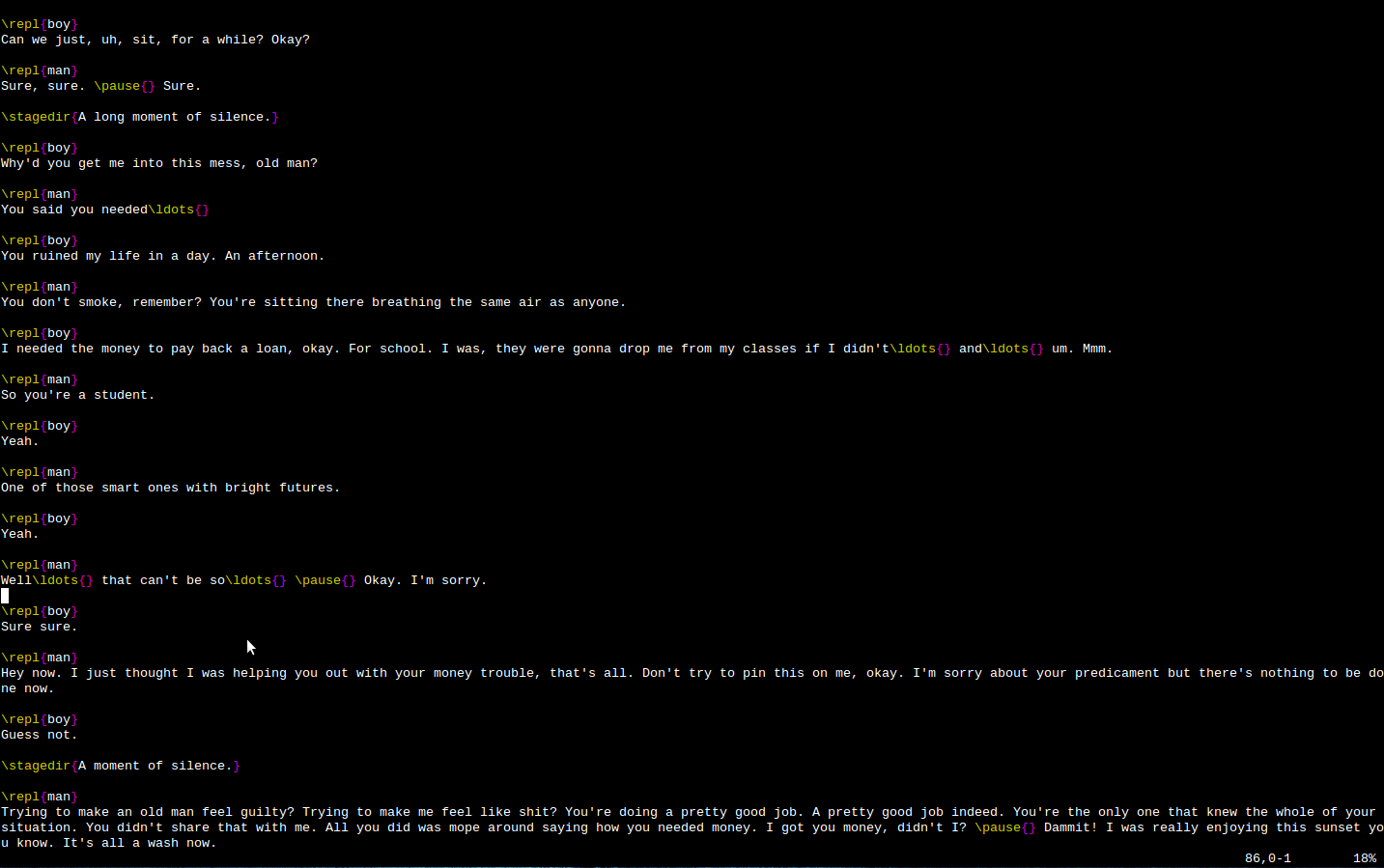To revise, or not to revise, that is the Question
Last semester I penned a play called The Decision and asked for comments from a variety of sources (including in the comments of this website). The comments did not flood in. One of the difficulties of crowdsourcing something like dramaturgy with lengthy material (even as short as my ten-minute play) is that a play is too long. The concept of crowdsourcing almost requires something that can be consumed in one quick gulp.
Plays, however, are never really short enough to fit into that criteria. It doesn’t help that my plays are in PDF format instead of the quick to open HTML or TXT, but I really like the clean format that LaTeX gives me with the Sides class. I’ve also found Vim to be an ideal writing environment. For all the talk of distraction-free writing environments on productivity blogs nothing really compares to the simplicity of Vim (after, of course, you’ve learned the commands). Here’s my distraction-free writing environment:
At any rate, the comments did not come. While many people downloaded the play I don’t imagine that all of them read it. I also don’t imagine that all those who did read it had a particularly strong reaction to it (at least not strong enough to tell me what they thought). As luck would have it, however, my show is being produced. That means people have to translate those words from that “distraction-free” environment into the bodies of living actors, the reality of a physical space, and (eventually) into something an audience would pay to see (read: not my computer screen). These people must have an opinion.
Directors, and Dramaturgs, and Designers! Oh, my!
These wonderful people are tasked with something incredibly difficult. They are tasked with translating my 2-D writing into a 3-D production. If the writer is alive (Me = Alive / Shakespeare = Dead) and they are available (or it is the first production of the play) they are typically consulted as more of a collaborator during the production phase than our dear friend Shakespeare is these days.
One result of this collaboration happened recently when some of the production team graciously met to discuss my play. They came up with a series of statements and questions about my play that they shared with me. This is extremely helpful. Part of why I am interested in crowdsourcing the dramaturgical function for my plays is that I like ideas. I’m not the smartest person in the room, even if I am fairly intelligent, because we’re all smarter together. Together we come to better decisions and ideas than we do apart.
The list of questions they asked of me (and statements they made about the work) really help me see the play from a different perspective. I’m able to figure out what is working and what is not working. Oftentimes my wonderful production team helped identify why something wasn’t working (or was confusing). This is even more helpful.
The process also forced me to describe what I’m doing in non-playscript format. You can no longer hide behind the metaphoric language of a play or the suggestive stage directions — you have to explain yourself concretely. It turns out that this is an important step as it solidifies your goals and refocuses your selective eye. To that end, I wrote another draft.
The Words They Are a-Changin’
Of course it’s more than just words that change. Since plays are composed of “just words,” yet are able to elicit emotional responses, physical environments, and human actions, more than words change in even the smallest changes for a new draft.
I’m not going to get into the various changes here. I will, however, note two things that stand out to me in this draft.
- The idea of stopping the world with your finger.
- Once in reference to a small globe to find a new place to live (or possibly run away to).
- Finally in relation to the passage of time — the spinning of the actual earth.
- Mathematical skill, terms, and metaphors.
If you’re interested in locating the differences between Draft #1 and Draft #2 those concepts are the main ones that I’m aware of (because writers do not know everything about what they write).
The Drafts
These are both under the unfortunate All Rights Reserved until after the production. Then they will be released cc by-sa. Enjoy — and I’d love to hear what you think in the comments.
Draft #1: TheDecision
Draft #2: TheDecision(draft2)

Leave a Reply
You must be logged in to post a comment.